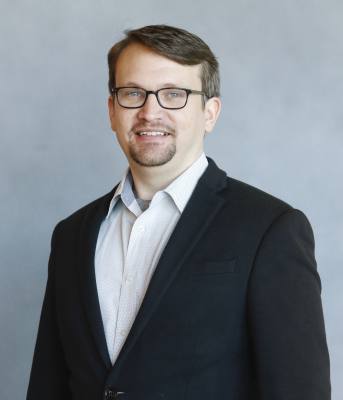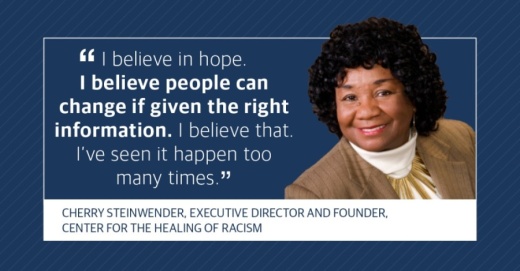That conversation continues today, and the organization that sprung from that effort, the Center for the Healing of Racism, today based out of Houston Community College's central campus, conducts workshops across the country to galvanize even more conversations, whether they are around kitchen tables, board rooms or halls of education.
On June 20, the center will have a virtual ceremony to give out its 27th Annual Juneteenth Ally Award.
Community Impact Newspaper spoke with Steinwender to learn about her work with the center, which has become even more vital in recent weeks.
When and how did you begin this work?
We started in 1989. It was started by a very multi-ethnic group ... African, European, Japanese and Latino or Latinx. These are the people who started the work, though never in our minds did we think about a nonprofit and what it is today. We were friends, and we decided we wanted to take the journey and really look at racism, to take it apart piece by piece and be very transparent with each other in the process. This group would meet around the kitchen table at each other’s homes. Eventually we did more. We started a film series and started to get people to attend ... and finally we recognized, we needed to form a nonprofit in order to meet the demand of people really wanting to talk about racism.
What does the group offer?
One of the commitments early on was to establish "Dialogue: Racism," a 16-18 hour workshop series where we work with groups. ... Then we created programs for a much younger audience, including high school and young children. We work with all people of all ages. We’ve been all over. We've been everywhere. We’ve conducted workshops in 45 states, Austria and Canada. With Zoom, we're doing that even more. We have worked with faith-based groups, corporations, universities, any one. It's a one-stop shop for anyone who wants to have that real dialogue. We have a set curriculum, the training manual for facilitators, and once you truly understand that curriculum, you will be able to understand any form of racism and the way that it is. We can pull out individual parts and do a standalone session for a couple of hours, but having the whole experience is where you truly see the impact.
What is your process?
We look at our racial conditioning. ... The concept is to give them a broader understanding of what racism is. In order to do that, we dissect that word and the many ways that racism shows up. We look at unaware racism, unconscious bias and white privilege. We work as a team. There is always a person of color and a person of European decent. Our experience of racism has been totally different, and there are things a person of color can say that people will buy or not buy. We are very careful of who will say what at a workshop. It affects how the message will be understood.
How do you keep pace with events and new questions?
Racism is constantly changing. From what it looked like when we first started, it has shifted. ... For example, in Texas we did not have a hate-crime bill when we started this. Then we had the modern-day lynching of James Byrd Jr. in Jasper. Today, we're dealing with George Floyd and we're talking about that. It changes, but then again, the same concepts are at work.
Right after President Obama was elected, everybody in news media said there’s no more racism, and that’s crazy to me. In Houston we elected Annise Parker to mayor, and just because we elected a lesbian, it doesn’t mean there’s no more homophobia. That would be ridiculous to think that.
How do you separate racist acts from being simplified as 'bad cops' or 'bad people'?
This is important. People used to think it’s just individual acts of meanness. But it’s not just that, it’s a system, institutionalized racism. And we're finally seeing more people recognize that. Merriam-Webster is changing its definition of racism to, "a system of advantage based on skin color," and that is more like the word that we think of when we talk about racism. Now we’re naming it. Now we may be able to do something.
Out in the arena doing the workshops, you make that distinction. These systems were created long before we were in the world. But the bottom line is, every day of our lives, we are at an advantage or disadvantaged based on the color of our skin. For white people, you didn’t have anything to do with it, but you cannot deny the fact that you benefit from it. That’s what white privilege is, and that’s so hard for white people hear, and we have so much pushback.
How do you address that?
They say, "I worked hard, I studied hard. I earned this position that I have." But I am not talking about working hard. I might say, "Wow, you did work really hard ... but there is something you got that helped you and you had nothing to do with: white skin."
My husband is Austrian, he is as white as you can be, blue-eyed and blond hair. He can tell you without thinking, "I drive through the cities of this country with a green card, but my white is American," which is saying, his whiteness is accepted completely everywhere, without question. He sees it so clearly.
The other reason I know white privilege exists is because growing up, I had friends who you might say were white-looking colored people, when they got older, they decided to move to other parts of this country where they knew they could pass for white, so they could tap into that privilege. It was a clear advantage and still is.
How do you address the fear that comes with talking about race?
We always we want to create a safe space. Martin Luther King Jr. said, men hate each other and fear each other because they don’t know each other. In order to do anything about racism, you have to break the walls of separation. You must have a safe, respectful atmosphere. The other thing, we never have in 31 years—never—attacked anyone and called them a racist. There’s no way you can use "healing racism" in your name and then retraumatize white people by calling them racists. ... But we have to be honest, and we have to have these difficult conversations. The fact is, they have been conditioned to think this way.
How do you keep the faith after all these years?
What I can say is, I believe in hope. I believe people can change if given the right information. I believe that. I’ve seen it happen too many times. For me, I live for one more workshop. I’ve seen that change in so many people, and you hear them tell you over and over, they say you changed their life.
There are other signs of hope too. We are finally calling it what it is. A lot of people were sick and tired of these companies saying they care about "cultural diversity" which is nice but it’s a fluffy name, and now they’re using the word "racism" in the political arena. Everyday citizens, faith-based communities are all speaking out and they're naming it. If you can’t name it, you can’t do anything about it.





